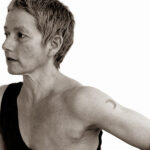
When Yogis Stiffen Up And Find the In-Between
September 28, 2016
Discussing Cultural Appropriation Amidst the Yoga Trolling
October 8, 2016“Honestly, I don’t know whether what I’m teaching is yoga anymore.”
If I had a dollar for every time I heard this sentence from the fantastically skilled yoga teachers I talk to in North America, I’d be able to afford the rent on a yoga studio in a gentrified neighbourhood.
Just joking.
But seriously. There’s a pause after they say it. Something between fear and equanimity hangs in that pause.
Here’s a composite of the speaker:
They’re a highly sensitive and generous teacher who after ten to fifteen years of practice, study, training, and teaching feels an oncoming crisis in self and cultural identity. It presents as insecurity and ambivalence along a number of yoga vectors.
They love the sensations, aesthetics, and meanings of vinyasa, but they’re increasingly aware of repetitive stress.
They love postures, but they’re also learning about functional movement. And the often-yawning gap between the two.
They have plateaued in practice several times, and have faced the question of doubling down, reframing, or changing. It’s often unclear which path to take.
They love discipline, but wonder whether they sometimes are repeating self-repressive patterns through a spiritual rationalization.
They’ve been inspired by the manic intuitions of certain gurus, but have seen the long shadows they cast.
They love serving others, but have felt the needy gaze of the student, and the nausea of discovering they are gratified by it.
They love revelations, but know how easy it is to use pleasure to dissociate.
They’re inspired by ancient wisdom literature, but they also know they’re living in a world that scripture cannot have imagined.
They cherish the feeling of a practice that transmits an essential wisdom through timeless techniques, but they’ve also read Singleton, and know it’s not that simple. (Shakes fist.)
They know they’ve benefited deeply from the solitude of self-work, but they’re queasy about yoga being mostly the refuge of a privileged class that often wants consolation more than justice. They get itchy when they hear younger teachers talk about changing the world through yoga.
They know self-regulation is essential but that it won’t address climate change or help #BLM directly.
They teach in neighbourhoods that used to feel locally vibrant. As their skills increased with age, they were able to offer richer programming. But they also had to charge more for it, because gentrification. At times they feel themselves locked into a consumerist feedback loop that is growing further and further away from the community they originally intended to serve, but which is also disappearing.
They got into yoga to feel less objectified, and it worked at first. But now they feel that gaze again.
They know that some devotees define moksha as the goal that makes yoga yoga. They’re inspired by this, but wonder what litmus tests of belief they would have to pass to really be feeling it, and how many ways there might be to feel freedom anyway.
They don’t associate their practice with religion, but the cultural appropriation discussion has made the religious roots of practice — and their love for or aversion to this — undeniable. They are aware of the colonial roots of modern yoga. They know they’re practicing something from somewhere else on land that belongs to someone else. Their yearning to honour the tradition rises in tandem with their confusion over what exactly that tradition is.
They know that therapeutic goals and transcendent aspirations can pull the limbs in opposite directions on the yoga mat.
“Honestly, I don’t know whether what I’m teaching is yoga anymore.”
Sometimes the person utters the sentence with an enigmatic smile. They seem okay with it. That’s cool.
But then there are those who seem distressed by the problem, and are wondering whether they have to quit to retain their integrity.
I feel a prickle when hear their tone. I just figured it out.
I’m thinking: But isn’t that just it?”
Isn’t practicing with equal parts of hope and doubt — along with the creativity of their friction — a movement towards freedom?
Isn’t the self-inquiry that cuts right down to the nub — about absolutely everything — exactly what you wanted?
Haven’t you grown to see the inseparability of light and shadow?
Hasn’t it been clear for years that you can’t tell where the teacher ends and the teaching begins?
Didn’t you always need to improvise the most skillful response to any given stimulus, regardless of whether you read about it or were taught it?
Wasn’t it always more about responsiveness than about tasks or goals?
Wasn’t it your uncertainty that got you here?
Did you think that was going to change?
Isn’t it true that freedom isn’t free? Not in the American sense — but that freedom with integrity depends on being deeply bound to the trouble of the world?
Maybe wondering what to name what you’re doing is a sign you’re doing that rare thing to which the sages, whoever they were, gave that provisional name.